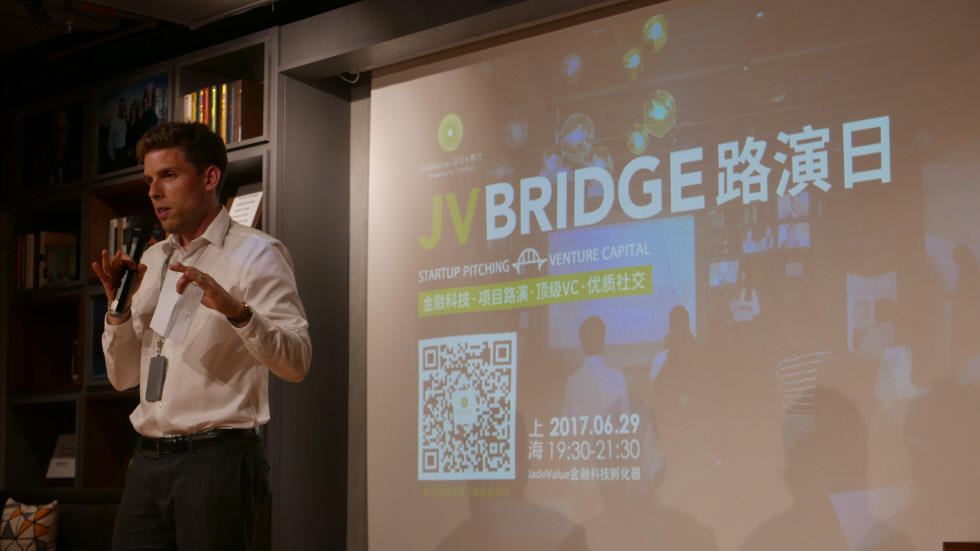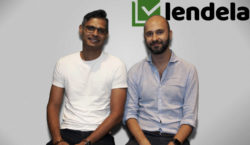Johan Uddman is the Swede in Shanghai who is strongly involved in building the local ecosystem for financial technology, or fintech start-ups. He is responsible for JadeValue (a CashBUS subsidiary) – a fintech investor and incubator space located in the heart of the financial centre of Shanghai. And now JadeValue InsurTech incubator has also opened.

Johan Uddman is the Swede in Shanghai who is strongly involved in building the local ecosystem for financial technology, or fintech start-ups. He is responsible for JadeValue (a CashBUS subsidiary) – a fintech investor and incubator space located in the heart of the financial centre of Shanghai. And now JadeValue InsurTech incubator has also opened.
Johan explains how this came about and what is going on within fintech in China and JadeValue’s role.
The journey to get to this position began some years ago when Johan went to China for post degree studies. After his studies Johan decided to return to China again, so it was a deliberate decision to seek a career there, and he first worked with a Danish guy helping him to build up an executive search company.
Then Johan got to know the owner of CashBUS, a successful Chinese entrepreneur who is today his employer and partner. Johan makes it sound like the most natural thing in the world, but this must surely be a unique pair so far in the Chinese start-up world.
“I got in touch with the founder and we got to know each other during a few months, right when he had started CashBUS. I could see how the company was growing, and got to know the team. It somehow made sense to start working with him, as we also had a good personal relationship – and I did. And since then the company has grown as a classic Chinese start-up.”
Johan had not previously worked within the start-up scene, and yet he is now in charge of running JadeValue, investing in Fintech start-ups and incubating some companies. JadeValue addresses the main barriers for start-ups; namely lack of capital, network and talent, and by introducing them to the Fintech eco-system.

“It has been more learning by doing, because when I joined CashBUS the team was around 30-40 in the tech team and has now grown to 250 of which JadeValue has 14 staff members So, also our business has grown a lot – monthly – since we started out, so I have been in a very tough fintech school for a few years now. And when working directly with the founders flying around the world and meeting other entrepreneurs and venture capitalists one learns quickly, so it has been a good school with me now ending up in a position where I am the person who myself invests and runs an ecosystem within fintech. It has been quite a fast journey indeed,” he smiles.
“JadeValue has a large office here in Shanghai, with one side as an investor We are on one side an investor, secondly we incubate some of the smaller startups to help them to grow. We have an in-house team assisting startups both in the incubator and our portfolio also not located here.”
“And right now, I’m also putting up an insurance technology fund that we will launch come December 2017. We are investing in early rounds, seed and pre-A., and then we will have a fund, but more for insurance technology.”
“One can say that we are on one hand an investor but Jade Value positions itself between all as a connector between traditional industry, capital, infrastructure and tech so we can have this entire network around us. Then we also have start-ups that we invest in and hat network too, so we are building up an ecosystem around our portfolio.”
Johan tells that he has been instrumental in building up certain things within the company, especially when it comes to foreign contacts and certain VC relations and he mostly manages their communication to the world outside China.
“We have been very active to be in the forefront and know what is going on and have developed a good international and local network. Mostly we have learnt things extremely fast, while CashBus’ business has been extremely successful – so we got a good combination and now we are in the limelight of the fintech network here.”

China has the largest fintech market in the world, with a highly tech-savvy population and leading innovation, and on this market CashBus has grown into a market-leading mobile consumer financial service provider.
The lack of credit history automatically excludes many people from such traditional services but with assistance from new technology the ability to underwrite through innovation based on alternative data has grown rapidly.
“The largest part of the Chinese population remains underbanked an also unbanked. And one must start often from scratch, so then we use what we call alternative data, which can be anything from data from their phone records, to e-commerce to behavioural data – everything. We use many thousands of data points, to create algorithms and models for our risk engine. And then, with many millions of customers, over time we increasingly have attempts to get a loan, which builds more data. Over time your bad loans consequently will go down based on those algorithms,” explains Johan.
“In fintech, the key is to have smart customer acquisition strategy and customer first focus, which you get by using your big, or smart, data in the right way and building models around that.”
CashBus already have many millions of customers and charge a fee for individuals taking a loan.
CashBus also builds other parts within similar verticals such as insurance technology, wealth management etc. “Many fintech companies that grow large in China are very good at using data. First, one has a core product, as we have done with a loan product. But then when you have lots of data it is quite easy to use that also for other products, for example insurance products. That’s the trend in China, with e-commerce in China where Alibaba and others have wealth management, insurance – everything in one.”

Inclusive financials services will be the big gamechanger in China going forward.
“Within lending etc. most of the population has not had access at all to get some sort of credit, with no history, and banks in China are usually government-owned and have not had any interest in driving innovation to be able to be more inclusive,” the Swede explains and continues: “So these alternative lending companies in China come with a function too; if individuals need smaller credits they can perhaps build on that and continue to get it from a bank in the future to invest in an apartment etc. And you also have a large middle class growing fast in China, but when they have grown fast and gained a lot of capital they lack ideas what to do with it and for instance investment advice etc. have often been reserved for high net worth individuals.”
“But when you get more wealth tech such as Robo-Advisory [digital financial advice based on mathematical rules or algorithms] and different investment products like Ant Financial where one can invest in their digital funds with almost no money at all, and where one can invest easily and get very cheap advice via algorithms then it will also become more inclusive.”
There are also similar needs concerning good insurance coverage.
“Insurance is difficult to grasp, not user-friendly and reserved for the group with more money. Now one can do insurance that is more micro level and more affordable and via mobile and much more focused on the customer. There we can see that more people will get access to insurance and better information and more transparency as more technology enters the insurance business, which traditionally is very old-school using old legacy systems.”
“And one of the largest revolutions will probably come with blockchain where one can revolutionize everything to do with intellectual ownership of data, transparency, so there is a need for huge amounts of investment,” Johan also predicts, as many others also do.
As for the traditional banks Johan says some of them are seriously looking into it. But it is still at a very early stage.
“One is seeing, like with insurance companies, that they are critically aware they will be the audience on the side lines unless they develop new tools now. Many large insurance companies invest and collaborate a lot with start-ups to get hold of the technology needed to meet the customers’ needs in the future. Startups might also need to partner with insurance companies for licensing and regulatory reasons, and also to get scale, customer base.”
With artificial intelligence, big data is currently also re-innovating the real estate industry, which will be especially disrupting force in emerging developing economies, such as China, according to JadeValue.

“For instance, we have invested in a start-up that is like a housing man as an ecosystem where one can via technology see how many rooms are available and that connect tenants, owners and landlords. Then you have technology that filtrate all information not needed and get the right info on what rooms that one can rent in e.g. Beijing.”
In China you have no trust in information; you believe it’s false and there is no real consumer trust in brokers, agents etc. The real estate AI start-ups turn this upside down by being transparent, giving the right information about real estate and connecting all parties in a cost-effective way.”
Being a foreigner in China Johan can also give a few words of advice when it comes to entering China within fintech, saying that it is quite difficult to launch a fintech company and that many underestimate this.
“If you bring your fintech company to China to do things in China you must really understand the Chinese culture deeply. That’s the first part that is difficult to understand for entrepreneurs. And you must also understand the dynamic and the importance of your network here which is much more important than in Europe. They think there is always a big market and it is only a matter of coming here, but if there is a large market you also have extreme competition. Then you have some who are smarter and open here via local partner, which usually works the best.”
“And in China you really need to have something that stands out, otherwise you will have 15 copycats within one week! And you must be very technologically clever, because China is among the foremost in the world when it comes to big data in the forefront.”


